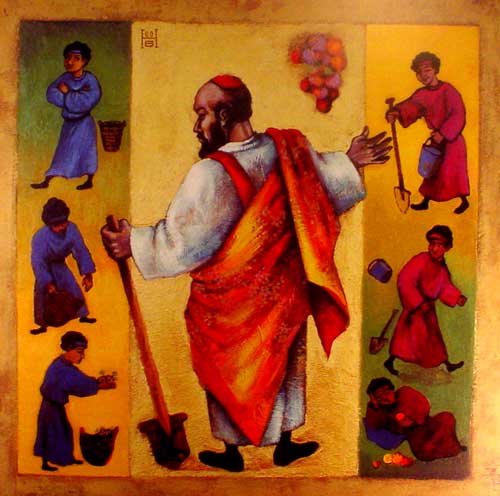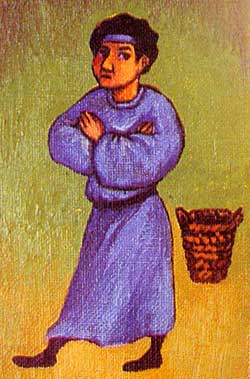


"Two Sons" by Kazakhstan Artist Nelly Bube.



This parable is found only in Matthew. But what precedes it (verses 23-27), found also in Mark and Luke, must be considered before the parable itself. It took place on Tuesday of holy week.
Fahling: The last full working-day of our Lord's public ministry to Israel had arrived. . . . It was the busiest day of His life. It was His last day in the Temple, the last day of His teaching, the last warning He gave the Pharisees and Sadducees, and His last call to national repentance.
Representatives of the Sanhedrin came to Him with a double question. What right did He have to preach as He did, do the miracles He did, enter Jerusalem as He did, cleanse the Temple as He did? Furthermore, who gave Him this authority? It was a blasphemous question because they knew the answer. Compare John 10:22-26, which happened several months before holy week. Jesus has told them but they refused to believe.
The Sanhedrin had a perfect right to check on the religious life of the people and to question a religious leader. But, on this occasion (Matthew 21:23), the question was plainly malevolent, which becomes clear as we proceed. They wanted to trap Him and thus bring a charge against Him.
Bengel: This was the customary question, which occasioned the final trial.
True. They rejected His divine commission. And they expected Him to restate it as He did often before.
Fahling says: Their inquiry was a smoke screen behind which they could make preparations to carry out their murderous resolves.
To their surprise Jesus asks them a counter-question.
Lenski: It is done with perfect mastery, psychological, and otherwise.
Jesus says: "I shall ask you just one thing." It was by no means an evasion nor was Jesus turning them off. His answer was contingent on their answer.
Lenski: The true answer to Jesus' question is the true answer also to the question of the Sanhedrists.
"The baptism of John" Jesus means far more than the Baptist's baptism. He means John's entire mission. "From heaven" means "of God, heaven sent, genuinely of God." "From men" means "without divine authority, of mere men." Read John 1:19-28.
Three years before, the Sanhedrin had sent a delegation to John asking about his person and his baptism. He gave them clear answers. Furthermore, read Luke 7:29-30. All the people knew precisely what the mission of John was. It was limited to Israel (John 1:31 ). Furthermore, John pointed to the Savior Who was about to fulfill all of God's Messianic promises. His mission is summarized at Luke 3:3. His message was identical to that of Jesus (compare Matthew 3:2 with 4: 17).
Now back to Matthew 21:25. The Sanhedrists knew the correct answer to Jesus' question. But, they were not concerned about truth. If they would say "from heaven" they would have had to admit that they had been wrong. Thus they would have lost face with the people.
But, if they would say "from men" they would have met with physical violence from the people.
Lenski: What was decisive for them were the consequences involved in the two possible answers they could give. They find themselves impaled by either answer.
Such is obdurate unbelief. If persisted in, it causes one to fall into the very pit which the unbelievers dig for others.
Fahling: What they were unable to deny, they were nevertheless unwilling to admit.
Ylvisaker: The acceptance of Jesus could not be separated from the recognition of John. Both would stand or fall together. If they denied that Jesus was the Messiah, they must refuse likewise to acknowledge John as a prophet, and brand him as an impostor.
Exactly. By the way, there are those today who claim that the Baptist's baptism was not valid and that those who were baptized by him had to be baptized a second time. That leads to a denial of Jesus. It is inevitable. Acknowledgment of the mission of the Baptist and acknowledgment of Jesus, the Messiah, go hand in hand. They stand or fall together.
Their response to Jesus is: "We don't know." They do know. They are lying.
Fahling: What an admission by the 'incorporate wisdom of Israel'! And what a death-blow to their pretensions!
Ylvisaker: They are craven and cowardly, the unfailing mark of malevolence.
Bengel: A forced confession of most disgraceful ignorance. . . In which ignorance however the proud at times prefer seeking a refuge, rather than yield themselves up to the truth. The wicked is caught in his own snare.
Stoeckhardt: We see here how morally wrong unbelievers are, because they cannot deny the power of the truth, but will not submit to it, resorting to lies, evasions, and lame excuses when they are confronted with it.
Lenski: Since the true answer to Jesus' question is the true answer also to the question of the Sanhedrists, by refusing to give the one they refuse to receive the other; and so Jesus is compelled to refuse to offer it to them.
Jesus' answer to the Sanhedrists in this verse is by no means rude. He refuses to cast pearls before the swine.
Here begins our pericope, found only in Matthew. Jesus said this immediately after verse 27. Instead of an answer (verse 27) He asks them a question of simple logic which introduces a parable. The answer is simple. The Kingdom of heaven is still open to these Sanhedrists, but, at this point, they need Law to bring them to repentance. The parable proceeds from love, not vengeance.
The man, in the parable, is God. The two sons represent two kinds of people in Israel. Both are equally sinful. The call to repentance goes out to both equally. "Son" is a term of endearment. NEB and JB have "my boy." "Go" denotes urgency. "Work in my vineyard" in application means "Become a child of God by faith in the Redeemer." The vineyard is explained in verse 31 as the church on earth, the active believers in Jesus. The work, in application, denotes God working faith in them (John 6:29) and they producing the fruits of faith (John 15:5).
Ylvisaker: There is no word of polite address, not 'father' nor even 'master'. His is the answer of willfulness and obstinacy.
Lenski: The reply of this first child comes as a shock; it is blunt, rude, without a trace of respect.
But later he "changed his mind." This is not the regular word for repentance, even though it is sometimes translated "repented." In his M.Div. thesis ( The Concept of Repentance in the Scriptures and the Lutheran Confessions, 1980, pp. 27-28) Paul Rauscher writes . . .
The use of 'repented' on the part of Jesus would have tipped them (the Sanhedrists) off to what was coming, for everyone knew that John preached a baptism of 'repentance'. Therefore Jesus uses a word to indicate the regret and the sorrow of 'repentance' without actually mentioning true repentance.
The versions variously translate this participle with "he repented, he changed his mind, he regretted it." Here "repent" means that after his regret he went to work in the vineyard.
In each case the father approached the son. And his call or plea with both sons was the same. Now comes the reply of the second son. Note the polite address "sir."
Ylvisaker: The second son says 'sir' not 'father' as we should have reason to expect. The fawning humility evidenced in his reply at once arouses a suspicion as to whether or not he is animated by the proper filial respect toward his parent.
Lenski: The response is again astonishing. The emphatic 'I' with the implication 'to be sure' and the very respectful address 'lord'. . . His readiness takes away our breath. . . . His promise was false; his character is plain.
In other words, piety of words attended by refusal of the heart. Compare Jesus' words at Matthew 15:7-9. Hypocrisy is a deadly sin, often apparent in the words and life of the unregenerate.
In verse 28 Jesus had asked: "Now, what do you think of this?" (AAT) Here comes the direct question, in verse 31. The answer is plain and unavoidable. Jesus counters with "I tell you the truth" which always denotes His divine authority.
Look again at their two questions in verse 23. Now Jesus states His divine authority and makes application of their own answer. Here we have in Greek something like our quotation marks. "The tax-gatherers and the harlots get into the Kingdom of God before you."
Bengel: Publicans who were unjust. Harlots who were unchaste.
Jesus is not winking at their sins. They were real and terrible.
NASB makes "the kingdom of God" future, eschatological. No. "The Kingdom of God" here denotes the Kingdom of grace, the church on earth.
Fahling: These despised and hated sinners are 'streaming through the door which is not yet shut'. . . With the word 'before you' Christ still leaves the door open to them (the Sanhedrists) for repentance.
Lenski: The last sentence of verse 32 makes it plain that the Sanhedrists are not going in at all.
That is true. They do not go in unless they repent. Jesus is not saying that the Sanhedrists cannot be saved.
This verse is explanatory. It gives the reason. "To you" is very personal. "To show" tells under what circumstances the Baptist came. It does not speak only of how John lived but primarily of his preaching and baptism. The publicans and harlots did not believe in John personally or in his way of living but in what he preached and in his baptism. Read Luke 7:29-30 again John directed people to Christ Who is the Way (John 14:6).
"The way of righteousness" is used in Acts. Compare Acts 18:26; 19:9; 19:23. It denotes the method of salvation, the doctrine of the gospel. Five of our translations read: "The way of righteousness." That is literal. "Righteousness" here surely denotes the imputed righteousness of God through Christ. That was the only hope of publicans and whores. NEB is surely wrong: "the right way to live." TEV is weak: "the right path to take." JB is not much better: "a pattern of true righteousness."
"But, you did not believe him," i.e. the Baptist. Jesus is not speaking about believing in a person, but believing in a message which includes baptism. Read the wonderful testimony of the people, concerning Christ. John preached law. This brought many to a knowledge of their sins and sinfulness. But he also preached Gospel, the imputed righteousness of Christ. He was far more evangelical than people usually think.
The verse distinguishes those who rejected John's preaching from those who believed his preaching. What made publicans and harlots different from the Sanhedrists was repentance.
And now the last sentence of this verse. "And even after you saw this, you did not repent and believe him." The message needs careful thought. It is clearly concessive "although you saw." Saw what?
Fahling: They were too proud to learn from publicans and harlots.
Lenski: The Sanhedrists actually had a double reason for believing John (and thus also Jesus), namely not only the saving truth of righteousness preached by John but also the saving effect in the case of great sinners.
Right. Not only did they hear what John said. They also saw how the message affected open sinners. Even after they heard and saw, they did not even repent, i.e. acknowledge their duplicity, their hypocrisy, their sin. Read 1 John 1:8. Refusal to acknowledge sin is self-deception and proves that there is no truth in the person.
Contrition is caused only by the Law of God: Lex semper accusat, "The Law always convicts." The Law causes a man to be truthful about himself. "After you saw this" here means "after hearing the Law" which was preached to both open sinners and Sanhedrists.
"Repent and believe" needs careful attention. It has been called a result clause. That can be rightly understood. RSV, TEV, NIV, JB, NEB and AAT translate with the word "and." RSV is typical: "you did not afterward repent AND believe him." These translations are rightly bringing out the Scriptural truth that repentance is made up of two parts: contrition and faith. Both are a work of God in man, the first caused by the Law and the second by the Gospel.
But faith is not the result of contrition. Both AV and NKJV translate: "That you (ye) might believe him." And NASB has "so as to believe him." These translations might lead to misunderstanding. Rules of grammar should not be understood in the sense that all grammatical constructions of the same kind mean exactly the same thing. "Repent and believe" is classified as a result clause but must be interpreted in its own context and according to Scripture. It is result in the sense that contrition is followed by faith.
"Repent and believe" is very likely ingressive aorist "to come to faith." The antecedent is the Baptist. The intended sense is "come to faith in what he said." But Scripture often speaks as people speak. A parishioner may say of his pastor: "I love him because he converted me."Of course, he means that God used pastor to bring him to faith.
A few observations in conclusion: This text brings out the wonders of repentance and conversion. Likewise it brings out the terribleness of obdurate impenitence. Both classes of people here mentioned were equally sinful and were equally sought by the Word of God through the Baptist.
Meditate especially on the impenitence of these Sanhedrists:
They asked two questions to which they already knew the answer in verse 23. Thus they betrayed their malevolence.
Their refusal to answer Jesus' question (verse 27) was a lie (for they knew the truth), was motivated by selfishness (lest they would lose face with Jesus by being charged with unbelief and lest they would suffer violence from the people), made themselves ridiculous as not knowing what was going on in the religious life of the Jews, and amounted to a rejection of Jesus because the mission of the Baptist and that of Jesus (preaching of the Word, Law and Gospel) was identical. And thus they kept themselves out of the Kingdom of God (verse 31).
Jesus told the Jewish authorities (John 5:41-44): "I do not strive to attain the glorious approval of men, but I know you that you don't have the love of God in yourselves. I have come in the name of My Father but you do not receive Me. If some one else comes in his own name, you will receive him. How can you come to faith so long as you strive for glorious approval from each other but do not set your hearts on the glorious approval which comes from God alone?"
The Sanhedrists were respected by and approved among the Jews. The publicans and whores were not accepted by the people. That does not mean that the latter were more easily converted than the former. The reason for conversion never lies in man. But it does bring out the fact that religious leaders, both among the laity and in the ministry, must ever be on their guard not to place the approval of men above approval from God.